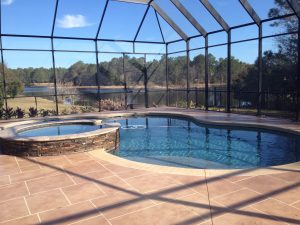
Northeast Florida is a fantastic place to live because we can enjoy our pools year round. Many of our customers enjoy the benefits of using their pool during the cooler winter months for both exercise and relaxation. Since the air has gotten cooler, we’ve gotten a lot of questions recently about the best way to heat your pool. Paradise Pool Service wants to help you extend pool season! In this post, we’ll explain the difference between pool heaters and heat pumps. We’ll also talk about efficiency and cost effectiveness.
Heater vs Heat Pump
Many people use the terms “heater” and “heat pump” interchangeably, but they’re actually two different types of equipment. A pool heater generally refers to a gas swimming pool heater that relies on either propane or natural gas to heat the pool water. A heat pump uses refrigerant to pull heat from the air and uses it to heat the pool water. In order to determine which option is right for you, there’s a few things you need to consider:
- When are you looking to heat your water? Do you heat all year long or just during the cooler months?
- How long are you willing to wait for the water to warm up, hours or days?
- Is it more cost effective for you to make a bigger investment up front to save money in the long run?
Heaters
Gas swimming pool heaters have the benefit of raising the water temperature quickly, so there’s no long wait for you to enjoy your pool or spa. Gas heaters have a lower upfront costs than heat pumps, but the fuel costs over the longterm will likely be higher. At Paradise Pool Service, we use the most energy efficient swimming pool heaters on the market. At 84% efficiency, every dollar you spend to heat your pool will give you an $0.84 return on investment. With two programmable thermostat options for pool and spa, our heaters will heat the water to the desired pool temperature, and then turn off until the water temperature calls for heat again.
Heat Pumps
Heat pumps are the most environmentally friendly option for heating your pool. While the initial investment in a heat pump is higher than a gas heater, there are no fossil fuels to burn. After the initial investment, our ultra energy efficient heat pumps start paying you back. Heat pumps are excellent for maintaining desired water temperatures, but they take longer than gas heaters to heat the water. Heat pumps use outside air as a heat source, so they work especially well in warmer temperatures. As the outdoor temperature drops, so does the output of your heat pump.
The Best of Both Worlds
We used to recommend buying both a heater and heat pump, and using them inline with each other for the greatest energy savings. The heat pump would be the primary heat source for maintaining temperature, with the gas heater only kicking on when the temperatures dropped, or the pool water needed to be heated quickly. This option wasn’t a cost effective solution for everyone due to substantial up-front costs. In 2018, Pentair Pool & Spa introduced the first hybrid pool heater to combine both a heat pump and a gas-fired heater in one unit. At a lower upfront cost, the hybrid heater is a game changer for providing lower energy costs for an extended pool season. In our opinion, this is the answer Northeast Florida has been looking for!
Let us put more summer in your calendar! Our knowledgeable staff can use the information from your current equipment to provide free savings estimates. If you’re interested in learning how much money you could save by converting to a heat pump or hybrid heater, contact us today!